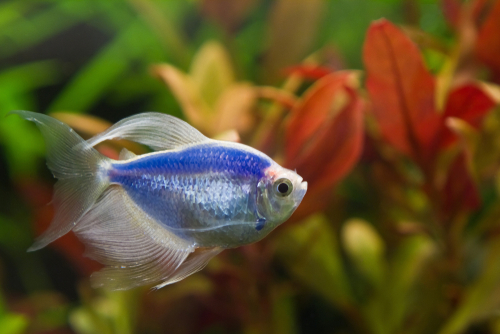If you are curious about adopting a glofish tetra, you have come to the right place!
These freshwater fish thrive in peaceful community tanks. Therefore, there is a wide range of compatible fish to choose from when selecting potential tank mates for your glofish tetra.
Continue reading this article to learn more about the best glofish tetra tank mates, including their preferred tank conditions and average care level.
Contents
What You Need to Know
Glofish Tetra are passive fish that make easy pets for any aquarist. As freshwater fish, glofish thrive in community tanks. They make wonderful tankmates with fish like zebra danio and shrimps.
The 15 best glofish tetra tank mates include the following:
- Zebra danio
- Rosy tetra
- Hoplo catfish
- Hog-nosed catfish
- Cherry shrimp
- Bamboo shrimp
- Harlequin Rasbora
- Bristlenose pleco
- Water loach
- Variatus platy
- Mystery snail
- White cloud minnow
- Newt
- Apple snail
- Hillstream Loach
The best tank mates are typically peaceful fish kept in community tanks.
The Best Glofish Tetra Tank Mates
The following are the 15 best glofish tetra tank mates.
You might also like:
1. Zebra Danio
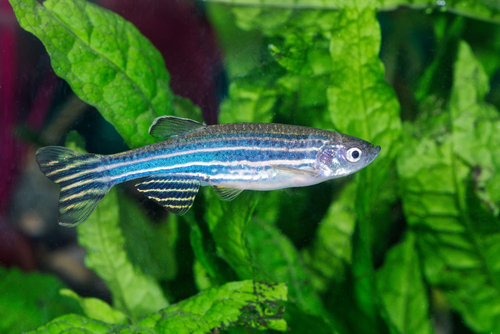
- Scientific Name: Danio rerio
- Adult Size: 1.5 inches
- Compatible: Peaceful, community tanks
- Water Temperature: 64 to 74 degrees Fahrenheit
- Minimum tank size: 10 gallons
- Care Level: Beginner
- Origin: South Asia
Zebra Danios are good tank mates to the glofish since they come in a variety of colors. They make good residents in a peaceful community and typically eat the same diet as glofish.
Pros
Zebra Danios will eat nearly anything.
Cons
Zebra Danio has somewhat territorial and aggressive behavior when kept in crowded tanks.
2. Rosy Tetra
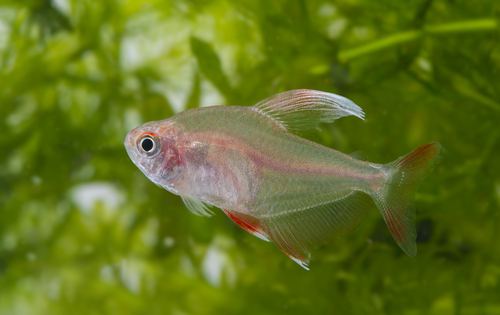
- Scientific Name: Pethia conchonius
- Adult Size: 2.5 inches
- Compatible: Peaceful, community tanks
- Water Temperature: 67 to 74 degrees Fahrenheit
- Minimum tank size: 30 gallons
- Care Level: Beginner
- Origin: South Asia
The colorful Rosy Tetra is a passive fish that gets along well with the glofish Tetra. The two fish eat the same food, so the beginner-level fish is easy to manage.
Pros
The Rosy Tetra swims along the bottom to middle of the tank.
Cons
When kept in small schools, they can become aggressive.
3. Hoplo Catfish
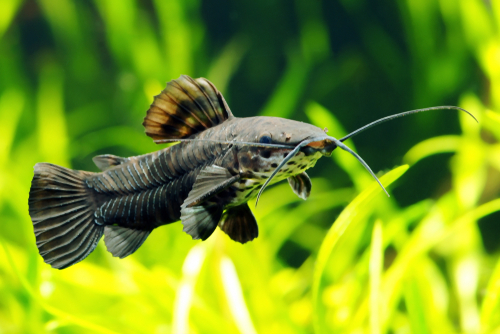
- Scientific Name: Megalechis thoracata
- Adult Size: 6 inches
- Compatible: Peaceful, community tanks
- Water Temperature: 72 to 86 degrees Fahrenheit
- Minimum tank size: 55 gallons
- Care Level: Beginner to intermediate
- Origin: South America
The Hoplo Catfish is a great tank mate to the glofish because they thrive in the same, peaceful tank conditions. In addition, they are good companions because they are non-aggressive and rarely show dominance.
Pros
The Hoplo Catfish is undemanding.
Cons
They are mostly active at night.
4. Hog-nosed catfish
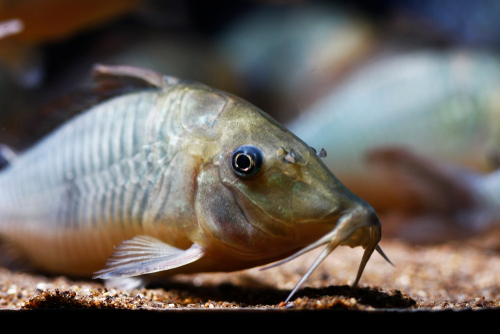
- Scientific Name: Corydoras multiradiatus
- Adult Size: 4 inches
- Compatible: Peaceful, community fish
- Water Temperature: 78 to 82 degrees Fahrenheit
- Minimum tank size: 40 gallons
- Care Level: Beginner
- Origin: Wild Peru
The hog-nosed catfish is a corydora large enough that the glofish will not eat them. They are a peaceful fish that pairs nicely with glofish because of their relatively passive attitudes.
Pros
They are good cleaner fish since they dig through substrate to eat leftover food.
Cons
Adults do not guard their eggs after laying them, meaning they might become food to other fish if you are not careful.
5. Cherry Shrimp
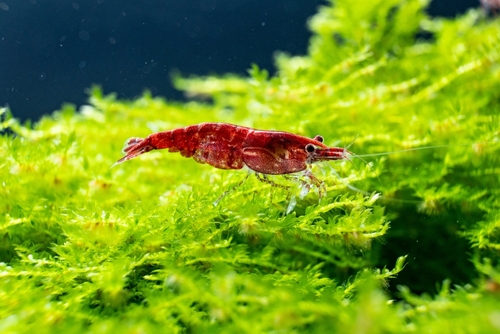
- Scientific Name: Neocaridina heteropoda
- Adult Size: 1.5 inches
- Compatible: Peaceful, community tanks
- Water Temperature: 65 to 85 degrees Fahrenheit
- Minimum tank size: 5 gallons
- Care Level: Beginner
- Origin: Taiwan
Cherry Shrimp are vibrant dwarf shrimp species that can add a pop of color to your tank. They are a good companion species to the glofish Tetra because of their active lifestyle and similar care conditions. Like the glofish, cherry shrimp are colorful and therefore they look nice in your tank.
Pros
Cherry shrimp can keep the bottom of your tank clean.
Cons
They spend their time at the bottom of the tank, which can be less entertaining to watch than other fish.
6. Bamboo Shrimp
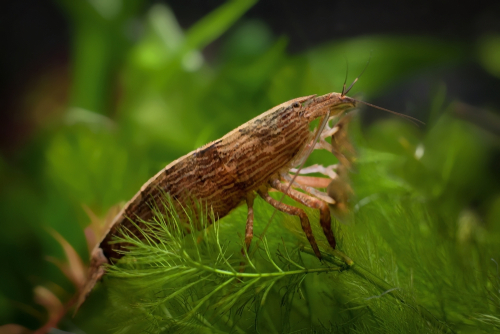
- Scientific Name: Atyopsis moluccensis
- Adult Size: 4 inches
- Compatible: Peaceful, community tanks
- Water Temperature: 68 to 85 degrees Fahrenheit
- Minimum tank size: 20 gallons
- Care Level: Beginner
- Origin: Southeast Asia
The Bamboo Shrimp, also known as the Singapore Flower Shrimp, is a cleaner fish that thrives in tanks with algae, vegetation, and leftover food scraps. It is greatly compatible with the glofish Tetra because of its size and passive nature.
Pros
The Bamboo Shrimp can survive in cold and warm water.
Cons
Bamboo Shrimp are a relatively small freshwater species, so they may the food of glofish tetra if you put them in your community tank before they reach full maturity.
7. Harlequin Rasbora
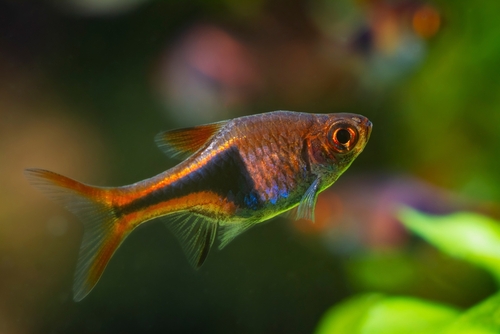
- Scientific Name: Trigonostigma heteromorpha
- Adult Size: 1.75 inches
- Compatible: Peaceful, community tanks
- Water Temperature: 73 to 82 degrees Fahrenheit
- Minimum tank size: 10 gallons
- Care Level: Intermediate
- Origin: South America
The Harlequin Rasbora, often called the red rasbora, is an attractive glofish tank mate that dwells on the bottom and middle of the tank. They are attractive because of their shimmering scales.
Pros
Harlequin Rasbora are community-based fish that thrive in schools of 8 to 10 fish.
Cons
Harlequin Rasbora should only be kept in small groups of four or fewer. Any larger and these fish could become aggressive.
8. Bristlenose Pleco
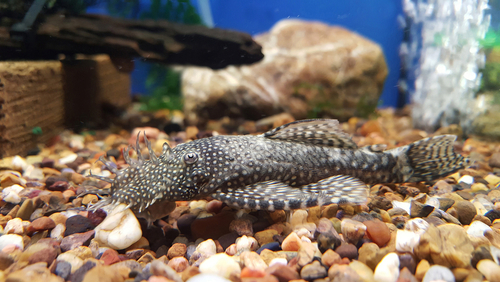
- Scientific Name: Ancistrus cirrhosus
- Adult Size: 5 to 6 inches
- Compatible: Peaceful, community fish
- Water Temperature: 73 to 81 degrees Fahrenheit
- Minimum tank size: 40 gallons
- Care Level: Beginner to intermediate
- Origin: Amazon basin of South America
The Bristlenose Pleco is a spackled pleco with facial hair. They are wonderful, cleaner fish that pair nicely with the glofish because of the similar tank conditions. Many aquarists enjoy the Bristlenose Pleco because of its unique appearance.
Pros
The Bristlenose Pleco prefers to eat mainly at night.
Cons
Larger plecos may suck on the glofish’s slime coat. However, if you keep them well-fed, this will not happen.
9. Weather Loach
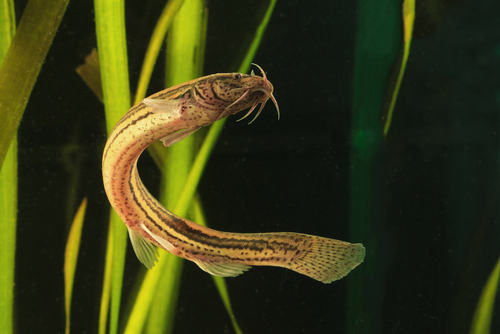
- Scientific Name: Misgurnus anguillicaudatusxiphophorus
- Adult Size: 10-12 inches long
- Compatible: Typically, a good tank mate for glofish
- Water Temperature: 50 to 77 degrees Fahrenheit
- Minimum tank size: At least 55 gallons
- Care Level: Beginner to intermediate
- Origin: Much of North-eastern Asia
Also known as the Dojo, the Weather Loach is a popular fish from Asia. Many people find the Weather Loach a great asset to their tank because the passive fish can keep their tank clean. They are a versatile fish that may thrive in a large range of environments.
Pros
The weather loach is a bottom-feeder that will clean algae and leftover food from your tank.
Cons
Weather Loaches can become ill when kept in dirty environments.
10. Variatus Platy
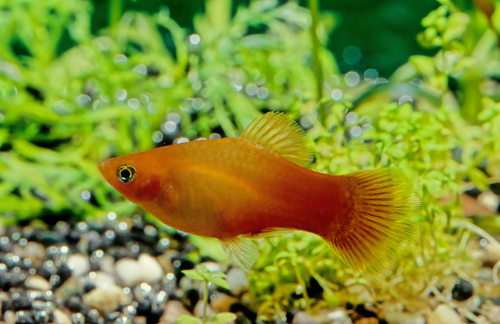
- Scientific Name: Xiphophorus variatus
- Adult Size: 3 inches
- Compatible: Community
- Water Temperature: 70 to 82 degrees Fahrenheit
- Minimum tank size: 10 to 20 gallons
- Care Level: Beginner
- Origin: Mexico
Variatus platies are colorful fish that thrive in small schools of five or more fish. They give birth to many babies, but the glofish cannot eat these babies to keep the population under control since they are not large enough. This makes the Variatus Platy a wonderful companion to the glofish.
Pros
Variatus platies do not require much room in their tank.
Cons
The relatively small fish may become food for larger fish.
11. Mystery Snail
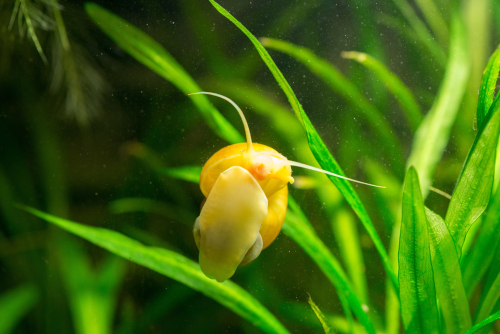
- Scientific Name: Pomacea bridgesii
- Adult Size: 2 inches
- Compatible: Peaceful, community tanks
- Water Temperature: 68 to 84 degrees Fahrenheit
- Minimum tank size: 5 gallons
- Care Level: Beginner
- Origin: South America
The Mystery Snail is a cleaner invertebrate that makes good companions to the glofish tetra because they can keep the tank clean. The Mystery Snail is an uncommon choice for most aquarists because of its appearance. However, they can keep your glofish and other species healthier.
Pros
Mystery Snails can improve the overall conditions of the tank.
Cons
Mystery Snails have a low activity level, so they are not entertaining.
12. White Cloud Minnow
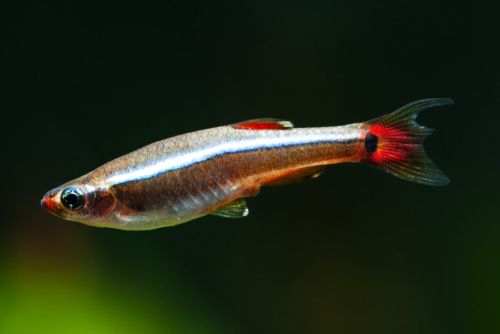
- Scientific Name: Tanichthys albonubes
- Adult Size: 1.5 inches
- Compatible: Peaceful community tanks
- Water Temperature: 65 to 77 degrees Fahrenheit
- Minimum tank size: 10 to 12 gallons
- Care Level: Beginner
- Origin: Southern China and Northern Vietnam
White Cloud Minnows are colorful fish that pair nicely with glofish because of their colorful appearances and passive natures. As a community fish, the White Cloud Minnow is typically peaceful among other fish, making it a good option for any community tank.
Pros
The colors of the White Cloud Minnow can change in better water conditions.
Cons
They are relatively small, so they can become food for the glofish if you do not have enough of them.
13. Newt
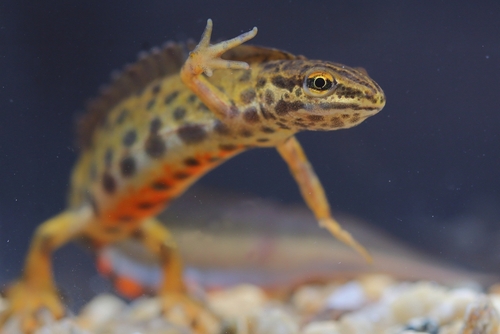
- Scientific Name: Newt
- Adult Size: up to 5 inches
- Compatible: Peaceful, community tanks
- Water Temperature: 66 to 74 degrees Fahrenheit
- Minimum tank size: 10 gallons
- Care Level: Beginner
- Origin: Europe and the Middle East
The Newt makes a good companion fish to the glofish tetra because of the similar care routine. The newt is most comfortable in cool water, similar to the glofish. They come in various colors, including striped, spotted, and blocked colors.
Pros
Newts are a long-term companion of the glofish because they do not typically interfere with one another.
Cons
They can escape easily if you do not have a tight-fitting lid since they are capable of climbing.
14. Apple Snail
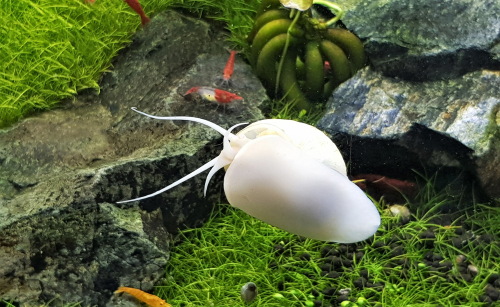
- Scientific Name: Pomacea bridgesii
- Adult Size: 6 inches
- Compatible: Peaceful, community tanks
- Water Temperature: 72 to 81 degrees Fahrenheit
- Minimum tank size: 10 gallon
- Care Level: Beginner
- Origin: Central and North America
Apple snails are a beginner fish that is a good tank mate for glofish. They may occasionally leave the water, making it important to have a floating or exterior place for them to stay.
Pros
In addition to their similar water conditions, the colorful appearance of the apple snail complements the glofish tetra nicely.
Cons
The Apple Snail requires higher temperatures than the glofish to thrive.
15. Hillstream Loach
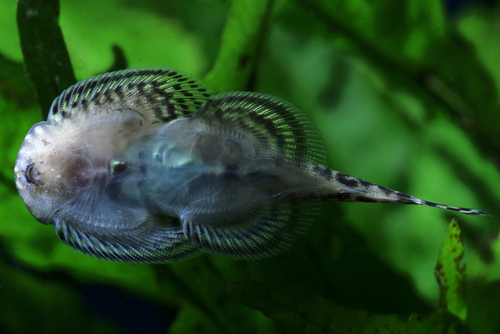
- Scientific Name: Sewellia lineolata
- Adult Size: 2.5 to 3 inches
- Compatible: Peaceful, community tanks
- Water Temperature: 68 to 75 degrees Fahrenheit
- Minimum tank size: 50 gallons
- Care Level: Beginner
- Origin: Asia
Pros
Hillstream Loaches are colorful.
Cons
The Hillstream Loach can be difficult to breed in captivity because of their rarity.
Hillstream Loaches, also known as Butterfly Loaches, make good companions because of their similar diets. They thrive well in the same conditions and have colorful appearances, which look nice alongside glofish.
Summary
Glofish are peaceful fish that pair nicely with a majority of bottom-feeding fish. Pairing glofish with bottom-feeders and cleaner fish ensures they will get enough food compared to the glofish, which eats a lot.
Since the glofish is a beginner level fish, they make good tank mates with other beginner to intermediate-level fish. Aquarists may pair them with multiple species at once.

Ian Sterling, founder of Fishlab.com, began his aquarium journey over 30 years ago, driven by a deep fascination for fish and their diverse personalities. His website, Fishlab.com, is dedicated to making fishkeeping accessible and enjoyable, offering beginner-friendly guidance, expert insights, and a community for aquarists to connect and share experiences.


